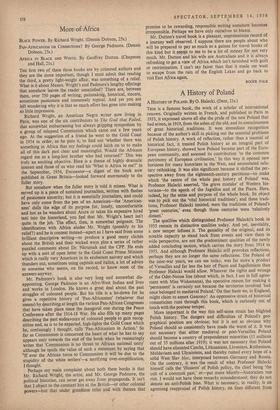More of Africa
BLACK POWER. By Richard Wright. (Dennis Dobson, 25s.) PAN-AFRICANISM OR COMMUNISM? By George Padmore. (Dennis Dobson, 25s.) THE first two of these three books are by coloured authors and they are the more important, though I must admit that reading the third, a pretty light-weight affair, was something. of a relief. What is it about Messrs. Wright's and Padmore's lengthy offerings that somehow leaves the reader unsatisfied? There are, between them, over 750 pages of writing; painstaking, historical, sincere, sometimes passionate and immensely topical. And yet you are left wondering why it is that so much effort has gone into making so little impression.
Richard Wright, an American Negro writer now living in Paris, was one of the six contributors to The God that Failed, that somewhat embarrassing but always gripping symposium by a group of relapsed Communists which came out a few years ago. At the suggestion of a friend he went to the Gold Coast in 1954 in order, as he puts it, to find out 'whether there was something in Africa that my feelings could latch on to to make all of this dark past clear and meaningful. Would the Africans regard me as a long-lost brother who had returned?' This was truly an exciting objective. Here is a theme of highly dramatic interest and those of us who read his 'What is Africa to me?' in the September, 1954, Encounter—a digest of the book now published in Great Britain—looked forward enormously to the fuller story.
But somehow when the fuller story is told it misses. What is served up is a piece of sustained journalism, written with flashes of passionate sincerity; but it is essentially journalism, and could have only come from the pen of an American—the 'American- ness' dulls the edge of its purpose for, lonely, uncomfortable and hot as he wanders about Accra or takes his expensive hired taxi into the hinterland, you feel that Mr. Wright's heart isn't quite in the job. The effect, then, is somewhat poignant. The identification with Africa eludes Mr. Wright (possibly to his relief?) and he is content instead—apart as I have said from some brilliant descriptive writing—to produce a good many clichés about the British and their wicked ways plus a series of rather puzzled comments about Dr. Nkrumah and the CPP. He ends up with a sort of open letter to the Gold Coast Prime Minister which is really very American in its exuberant naivety and which thunders out, sometimes using capitals and italics, a lot of advice to someone who seems, on his record, to know most of the answers anyway.
Mr. Padmore's book is also very long and somewhat dis- appointing. George Padmore is an Afro-West Indian and lives and works in London. He knows a great deal about the past struggles of coloured people. But his title is a let-down for he gives a repetitive history of 'Pan-Africanism' (whatever that means) by clescribiqg at length the various Pan-African Congresses that have taken place since the inaugural one during the Peace Conference after the 1914-18 War. He also fills up many pages describing the past endeavours of coloured people to gain recog- nition and, as is to be expected, high-lights the Gold Coast which he, confusingly I thought, calls 'Pan-Africanism in Action.' So far as Communism is concerned the heart of what he has to say appears only towards the end of the book when he reassuringly writes that 'Communism is no threat to African national unity' although he spoils the value of such a statement by saying that If ever the African turns to Communism it will be due to the stupidity of the white settlers'—a terrifying over-simplification, I thought.
Perhaps my main complaint about both these books is that Mr. Richard Wright, the artist, and Mr. George Padmore, the political historian, can never get away from propaganda. It isn't that I object to the constant hits at the British—or other colonial powers—but that under grandiose titles and with themes that
promise to be rewarding, responsible writing somehow becomes irresponsible. Perhaps we have only ourselves to blame.
Mr. Dutton's travel book is a pleasant, unpretentious record of a journey well observed. I suppose there are people about who will be prepared to pay as much as a guinea for travel books of this kind but it seems to me to be a lot of money for not very much. Mr. Dutton and his wife are Australians and it is always refreshing to get a view of Africa which isn't tarnished with guilt or recrimination. I can't say fairer than that it made me want to escape from the rain of the English Lakes and go back to visit East Africa again.
ROGER FALK


































 Previous page
Previous page